When students in Auckland Park don’t have water, they can’t wash and can’t attend class, says Kelsey Glennon, a lecturer at Wits University and member of the Melville Residents’ Association. For all of 2022, the water supply in the southwest of Johannesburg and north of the city has been on and off, and in August, it went off completely in many areas.
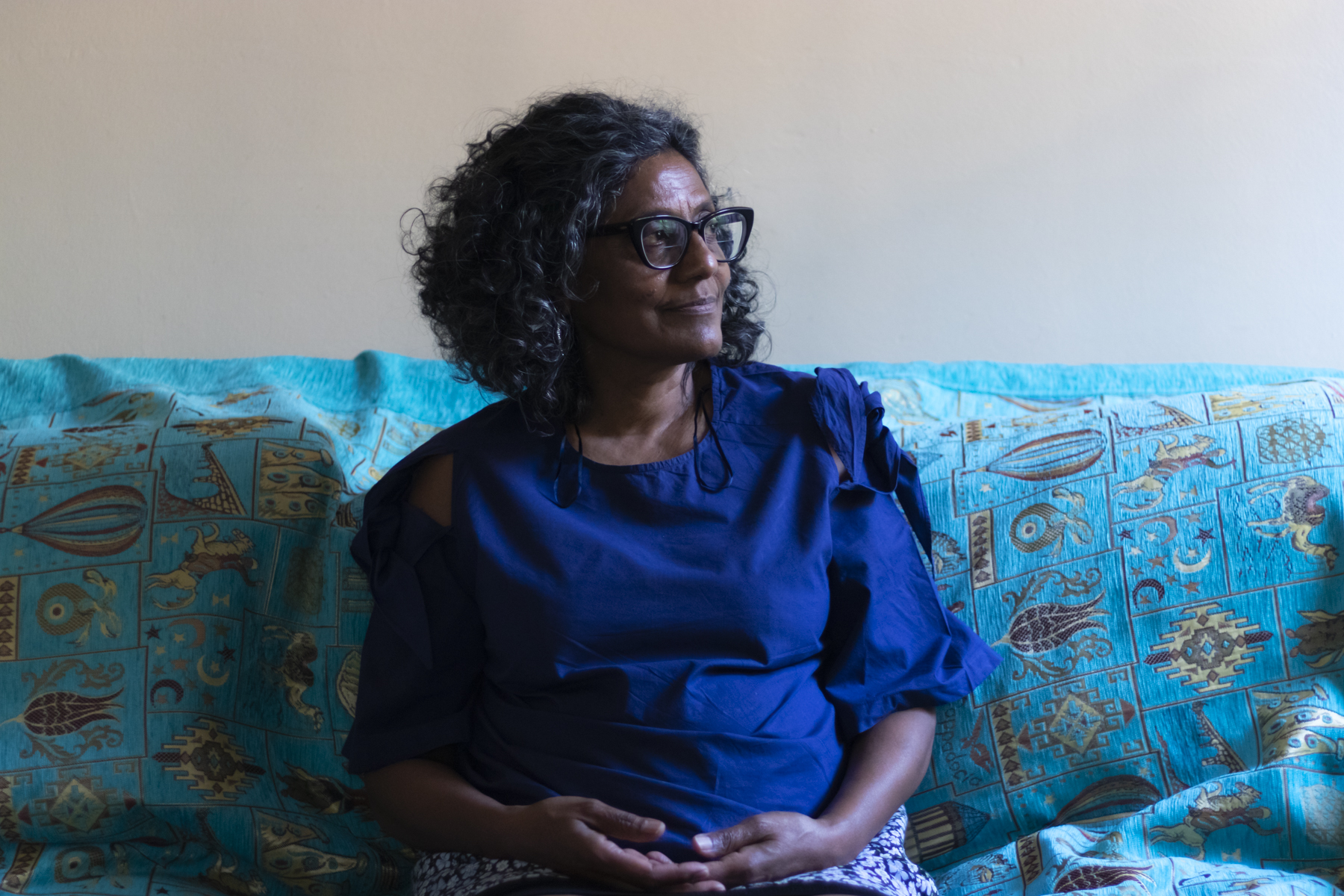 Carly Naidoo (65), a clinical psychologist who has lived in Westdene for 33 years. (Photo: Meseret Argaw)
Carly Naidoo (65), a clinical psychologist who has lived in Westdene for 33 years. (Photo: Meseret Argaw)
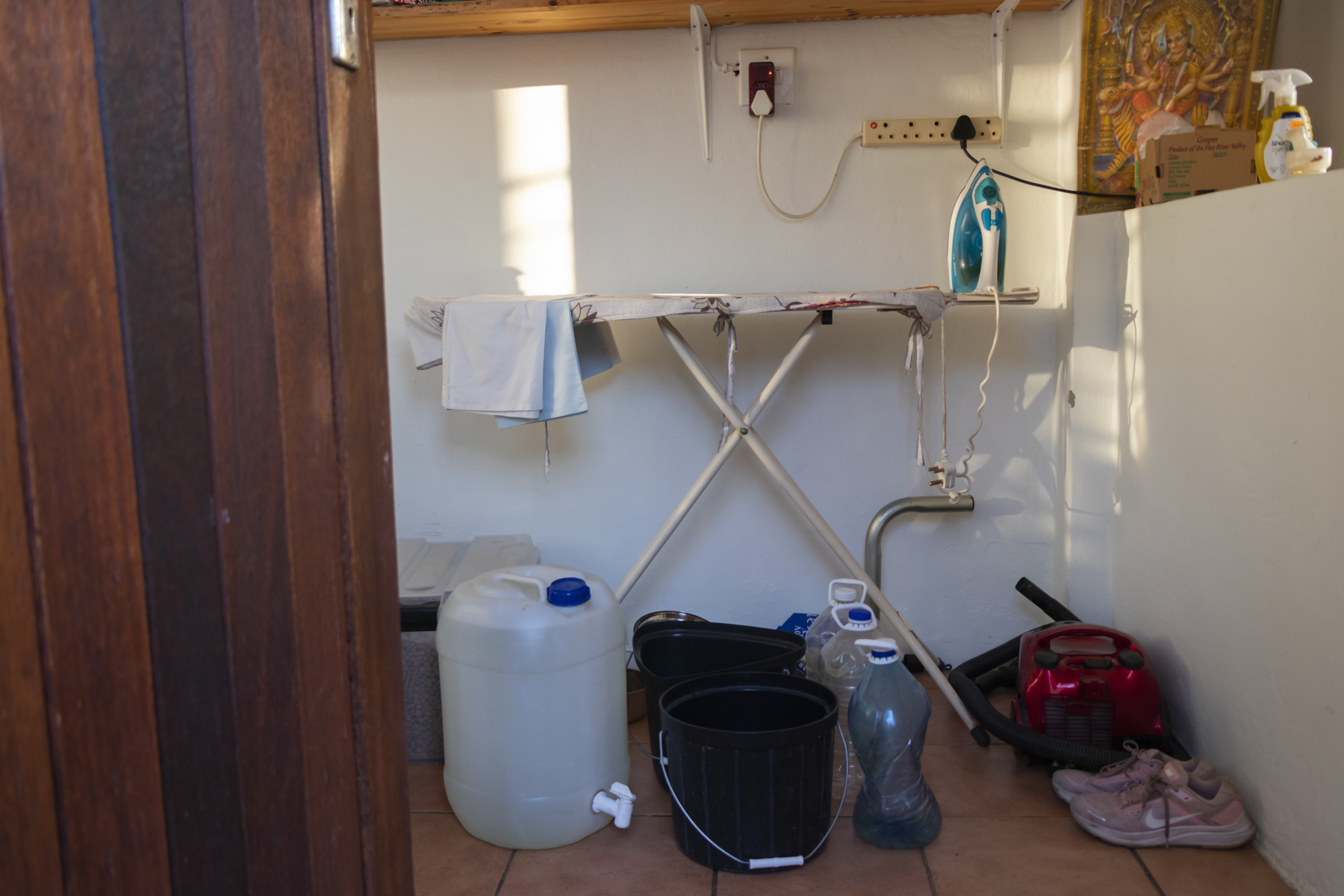 Water storage containers at Carly Naidoo’s, house in Westdene on 2 October 2022. (Photo: Meseret Argaw)
Water storage containers at Carly Naidoo’s, house in Westdene on 2 October 2022. (Photo: Meseret Argaw)
“I can deal without lights, but not without water,” says Carly Naidoo of Westdene, who, along with neighbours, has experienced water cuts almost daily in 2022. “It goes off in the morning and comes on briefly in the evening,” she says.
Tanks to collect water, wheelie bins filled with water and a run on bottled water are stories sprinkled across the city. Now Day Zero has come for millions of Johannesburg residents as water systems were shut down to allow reservoirs to refill on Tuesday.
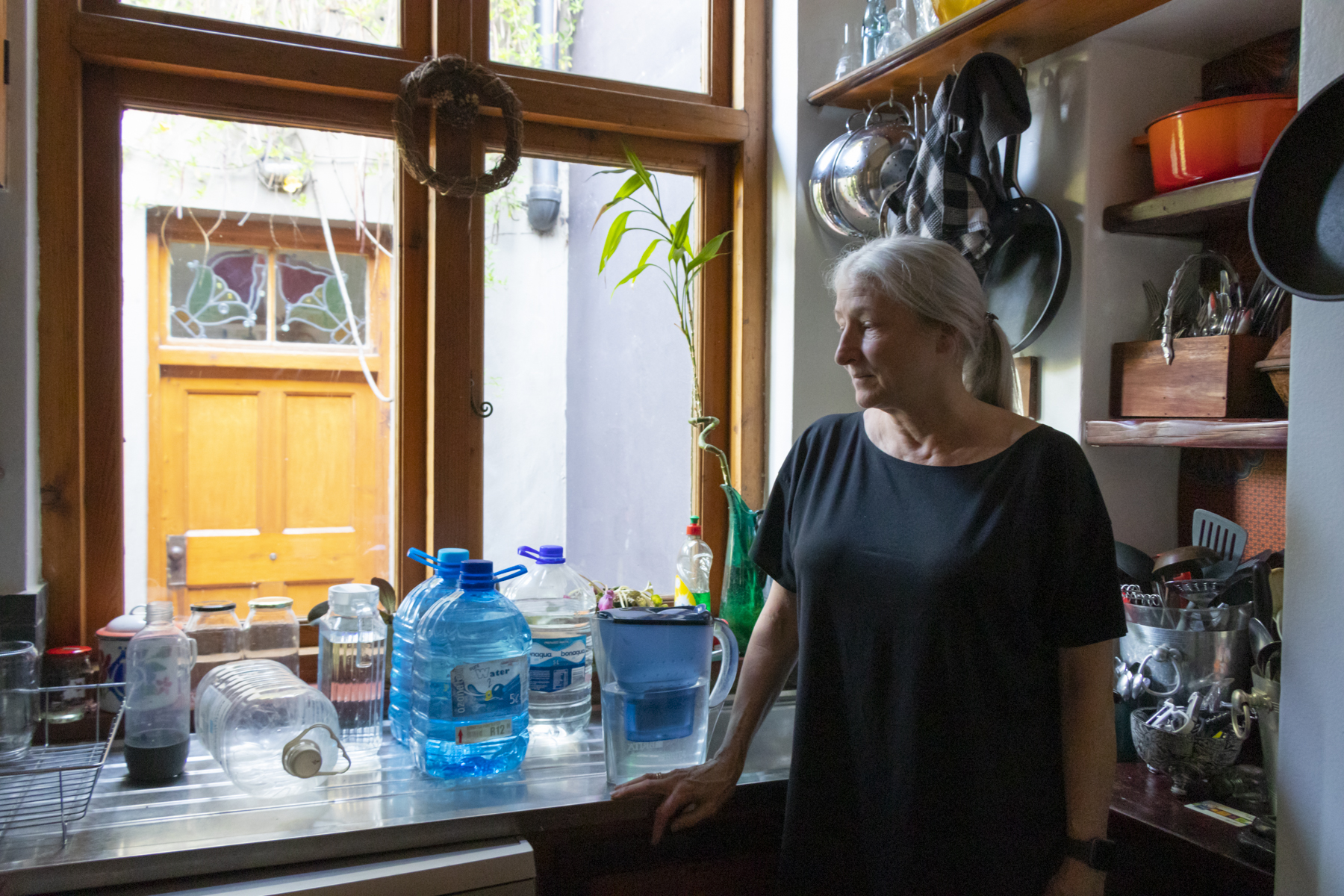 Karen von Veh (66), a Professor Emeritus at the University of Johannesburg and n Auckland Park resident. She has had no tap water for four weeks. (Photo: Meseret Argaw)
Karen von Veh (66), a Professor Emeritus at the University of Johannesburg and n Auckland Park resident. She has had no tap water for four weeks. (Photo: Meseret Argaw)
Auckland Park resident and University of Johannesburg Professor Emeritus Karen von Veh has had no water for four weeks.
“Our taps are completely dry — not even a trickle overnight,” said Von Veh in an update on 4 October after a weekend interview. Councillors in Johannesburg sent notices to communities, revealing that reservoirs had run dry as water cuts rolled across the city of six million people.
“Johannesburg Water’s networks in various parts of the City of Johannesburg are severely strained due to high water demand [usage]. The direct impact is extremely low levels within various reservoirs and towers,” said Johannesburg Water.
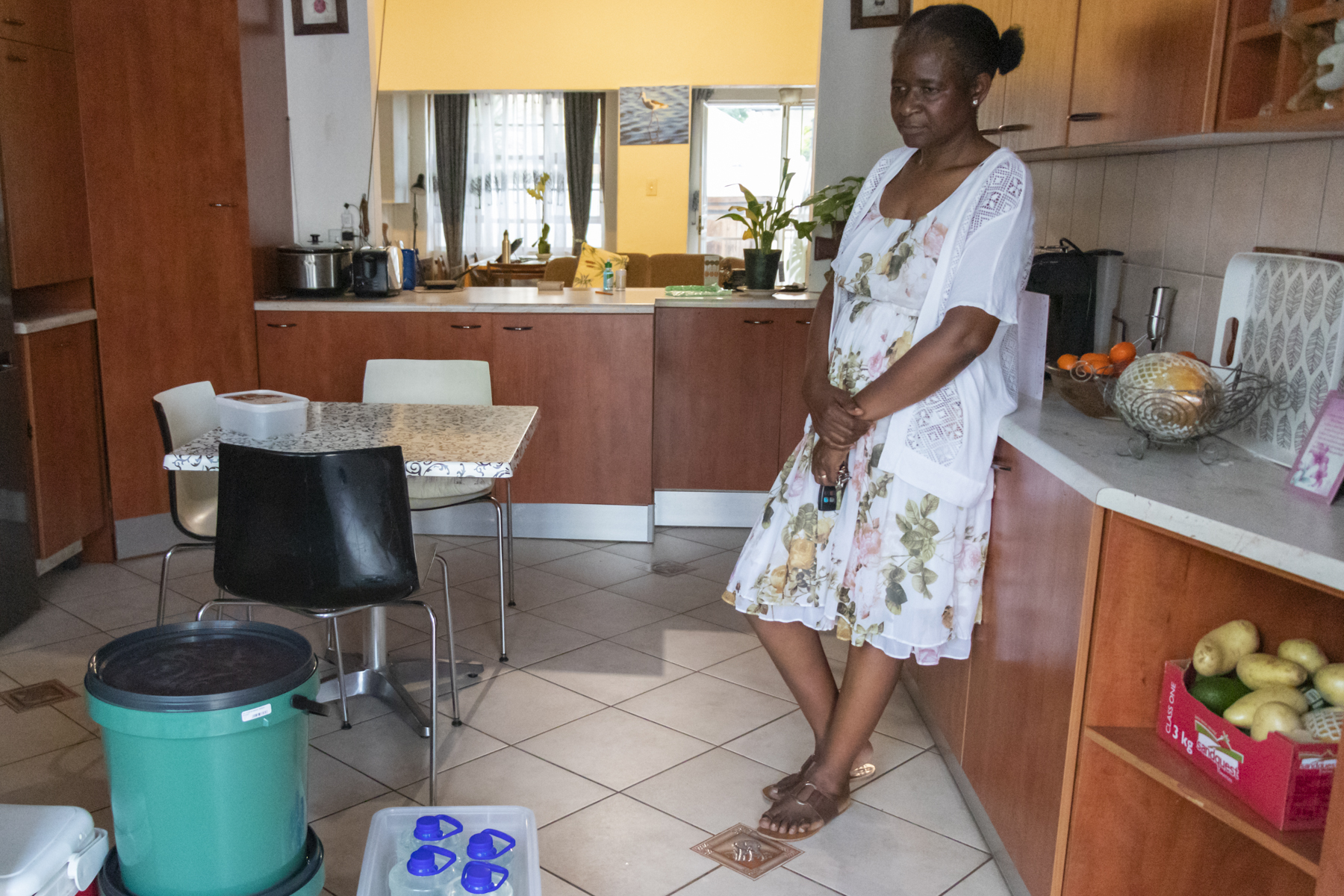 Constance Khupe (54), an academic adviser at Wits University, with her water containers at her house in Westdene on 2 October 2022. (Photo: Meseret Argaw)
Constance Khupe (54), an academic adviser at Wits University, with her water containers at her house in Westdene on 2 October 2022. (Photo: Meseret Argaw)
The Commando, Soweto and Central systems were out of commission, affecting nine reservoirs and covering much of the city. The Rahima Moosa and Helen Joseph hospitals do not have water and operate with water tankers. The University of Johannesburg is also out of water.
“Good morning all, water remains an issue today, so can I kindly request every staff member [to] bring in water bottles (any quantity) to help with the toilets and washing hands, etc. Thank you,” a doctor asked staff at Rahima Moosa hospital last week. (The message was sent to Maverick Citizen editor Mark Heywood.)
The hospitals have water tankers. But residents say that Johannesburg Water’s reported emergency supplies are sometimes claimed to be at addresses which don’t exist, while they once sent a water tank without a tap. See this report on the conditions at hospitals without water where staff in the emergency department have contracted gastroenteritis.
Rolling blackouts lead to water cuts
“The recent warm weather, as well as load shedding, has severely affected capacity at various Johannesburg Water systems (residents and towers),” said Rand Water in a statement on September 29.
A massive infrastructure outage and power cut (not load shedding) at the Vereeniging purification plant has affected pumping, so while the Vaal Dam is 92% full, there is water scarcity, and now Level 2 restrictions are coming across the city.
Visit Daily Maverick’s home page for more news, analysis and investigations
Rand Water is the bulk supplier to Johannesburg Water, and it choked supplies to the Eikenhof pumping station, causing a general system failure. The system is being slowly restarted to refill water towers, and the taps are dry for many of the city’s 1.4 million households.
Ageing infrastructure is buckling. Some of the city’s towers were built in the 1930s and have never been replaced. Across Johannesburg, deep trenches in the roads are evidence of water bursts through the tar as pipes at the end of their lives decay. It’s similar to the old Eskom coal power fleet, which has caused 17 days of consecutive power cuts across South Africa, and water outages are a knock-on effect.
Months without water
“They are load shedding us with water,” says Louise Grenfell of Melville, who has installed a 1,000-litre water tank in her garden and says the council supply is often off all day and that it trickles back from 10pm.
Development is outstripping infrastructure faster than Eliud Kipchoge in Johannesburg. The city’s planners are claimed to be in the pockets of developers who get permissions passed even where no infrastructure exists. Infrastructure installations, like a revamp of the breakdown-prone Hursthill Reservoir, get held up in the political bunfight over who runs the coalition.
Part of Greater Fourways, including Diepsloot, Fourways, Bryanston, Chartwell and Dainfern, have had intermittent water supply all year and did not have water for 40 days from June. It came back for two weeks, but is out again, a resident who did not want to be named told Daily Maverick. “They keep telling us it’s the same pipe; we’re not stupid,” she said.
A Lonehill reader said their area had had only intermittent outages while another reader in a different part of Fourways has reported outages all year long with a long multi-day Winter cut.
Mayor Dada Morero has not yet appointed his mayoral council, so the problem is falling between stools as former mayor Mpho Phalatse, who was voted out last week, heads to court. The impasse could continue for months while the water crisis deepens.
Read more in Daily Maverick: “Not without a fight – ousted Mpho Phalatse turns to court to win back Joburg mayoral seat”
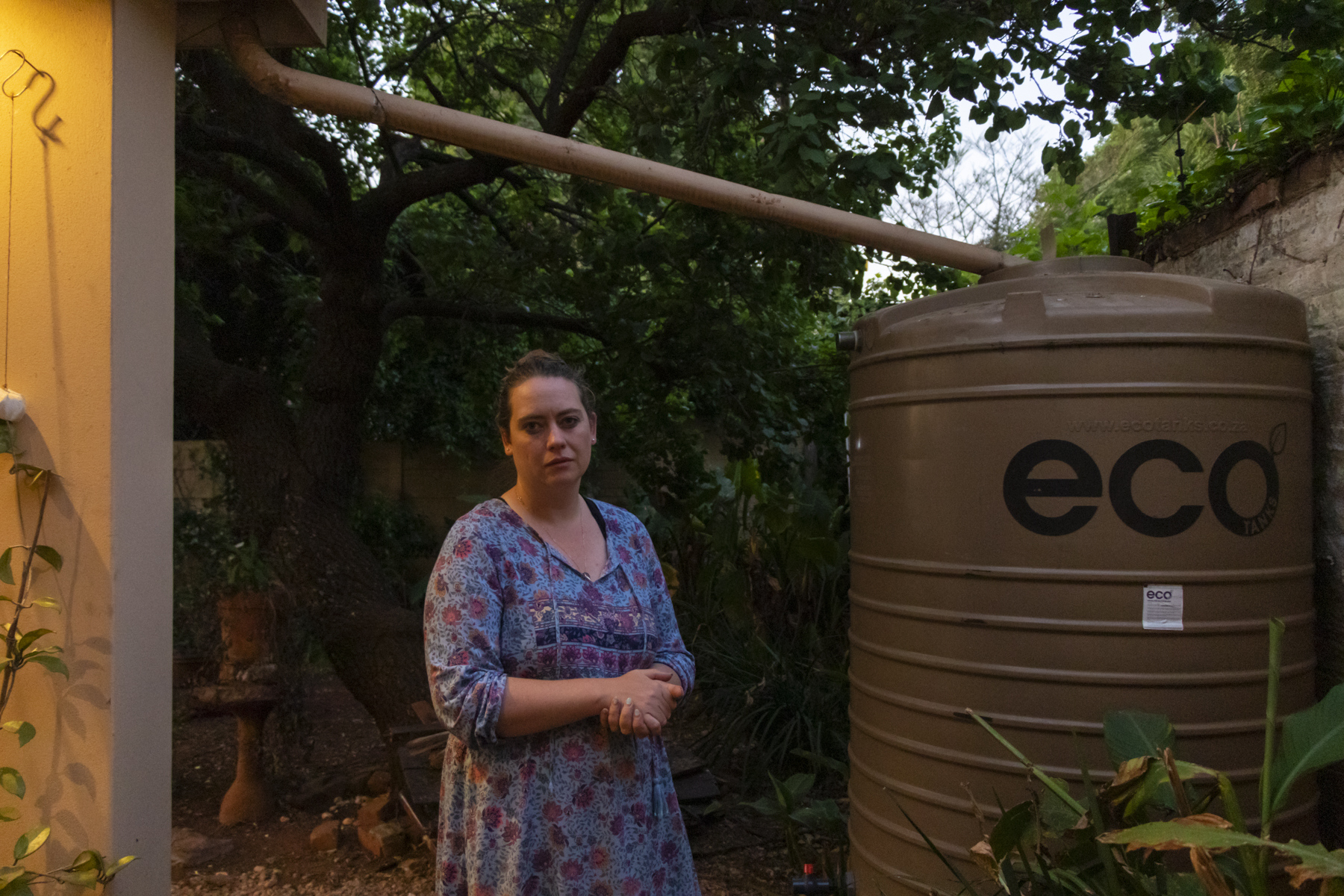 Julia Fish (35), journalist and Melville Residents Association member at an empty water tank on her property. (Photo: Meseret Argaw)
Julia Fish (35), journalist and Melville Residents Association member at an empty water tank on her property. (Photo: Meseret Argaw)
“They’re fighting for the best chairs on the deck of the Titanic,” says Melville resident and Melville Residents Association member Julia Fish. A journalist and environmentalist, she spends one in five days lobbying the city to put in infrastructure before allowing development like an upcoming VIP gentleman’s strip club and casino. Fish installed water tanks at her home, but these are now empty.
Johannesburg is in a heat wave, as Julia Evans explained here, and the increased water demand pushed the system to a tipping point. “Water infrastructure is a sprinkler system,” says Fish to illustrate how unstable the supply now is.
Water restriction levels
Level 1
- Watering of gardens is not allowed between 6am and 6pm in the summer months (September 1 to March 31).
- Using garden hoses to clean hard surfaces is also not allowed.
Level 2
- Sprays and sprinklers are banned.
- Handheld hosepipes can only be used between 5pm and 7pm.
- Vehicles should be cleaned between 5pm and 7pm, using hoses that have a trigger nozzle.
Level 3
- Sprinklers and other sprays and dripper systems aren’t allowed.
- Handheld hoses can only be used for 15 minutes between 5pm and 7pm.
- The use of grey water is advised.
- Filling of pools is allowed for 15 minutes using hosepipes.
Level 4
- Outdoor irrigation of commercial and industrial spaces is banned.
- Buckets of water must be used to wash vehicles.
- No filling of swimming pools.
- Recycling is encouraged, such as the use of grey water.
Level 5
- All limits of level 4 are upheld.
- The efficient and moderate use of water is encouraged.
Level 6
- Non-residential households and properties must cut consumption by 45%.
- Water drawn from boreholes should not be used for outdoor purposes.
- Watering for agriculture should be reduced to 60%.
Source: Councillor Bridget Steer. DM
Amendments for accuracy were made to this article at 8.30am on 5 October 2022, and additional information was added on 6 October, 2022.




 Julia Fish at an empty water tank in her property. (Photo: Meseret Argaw)
Julia Fish at an empty water tank in her property. (Photo: Meseret Argaw) 